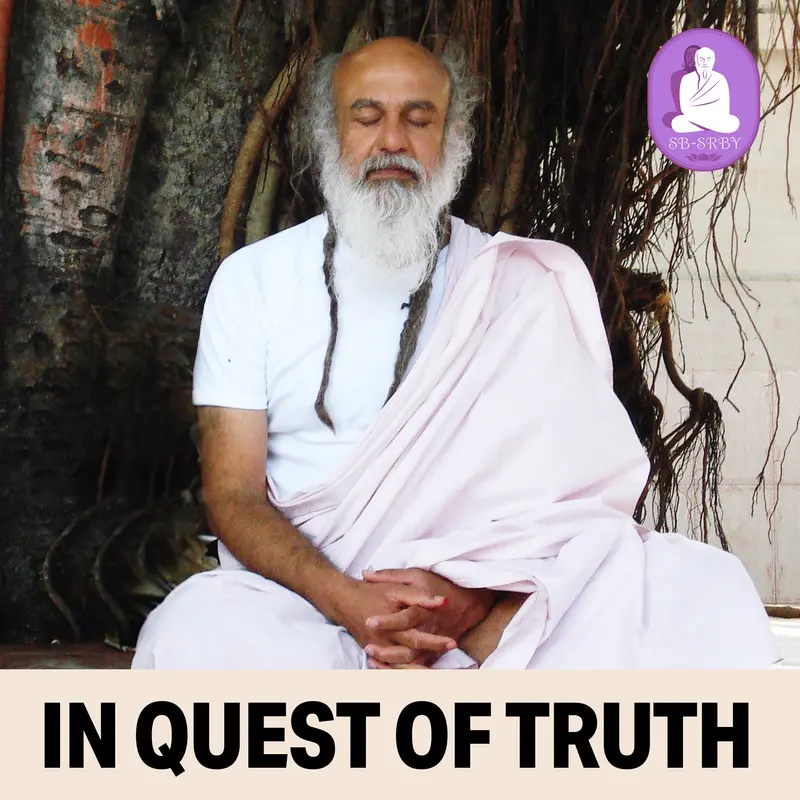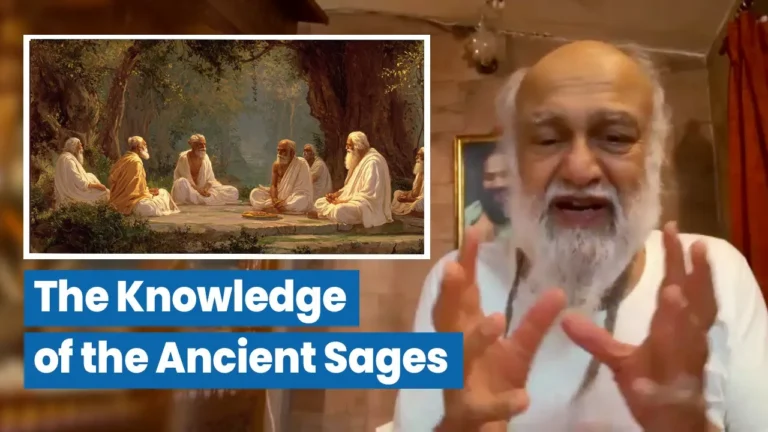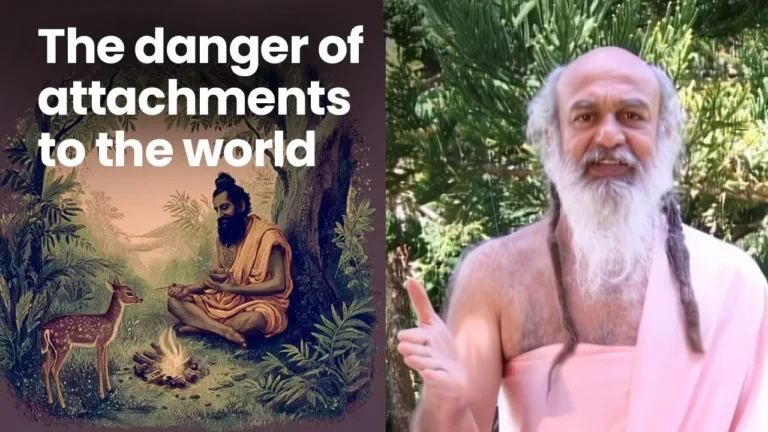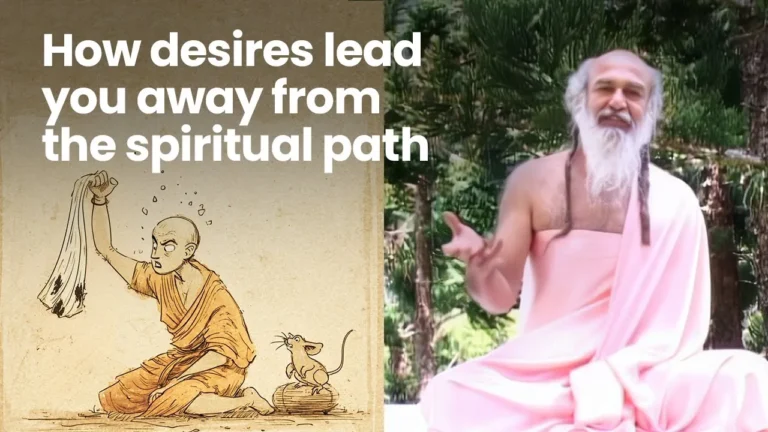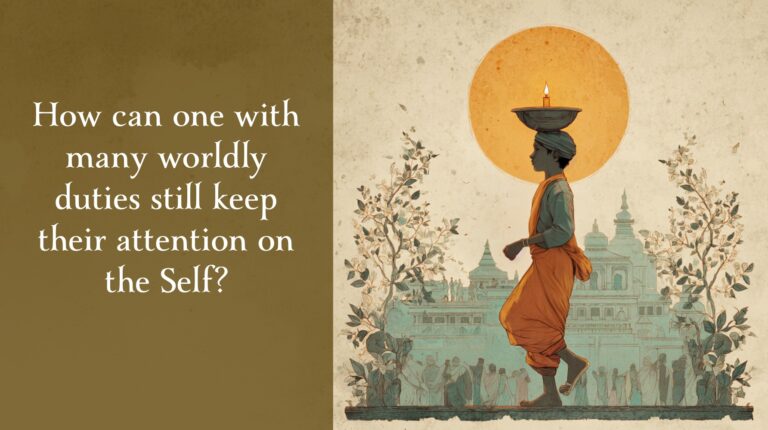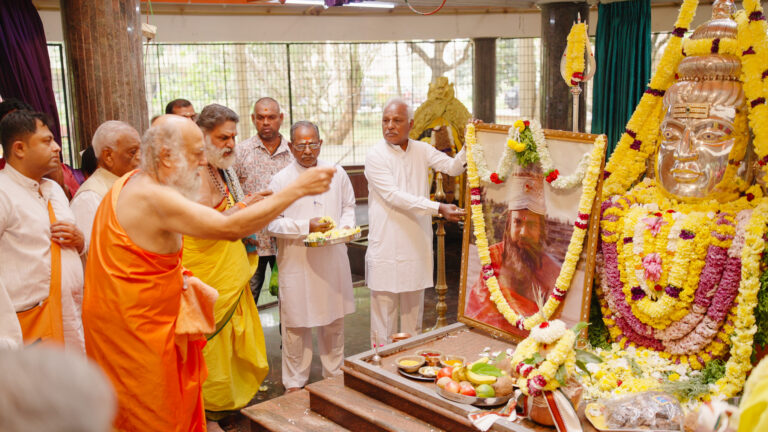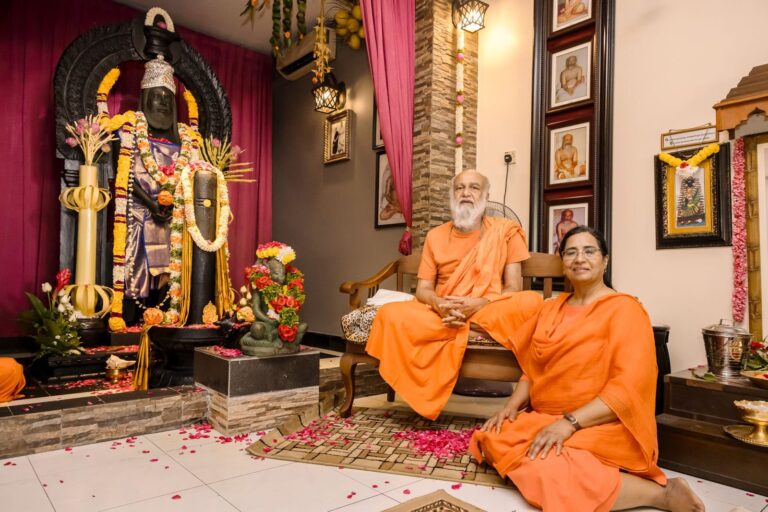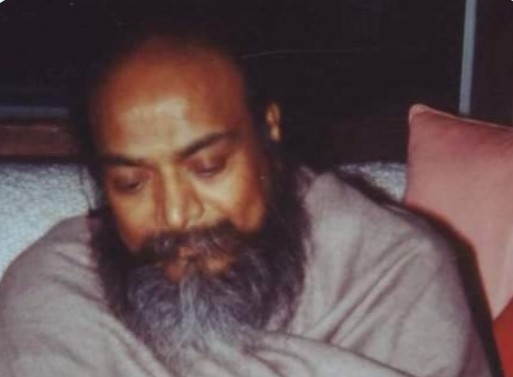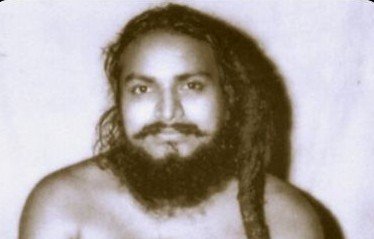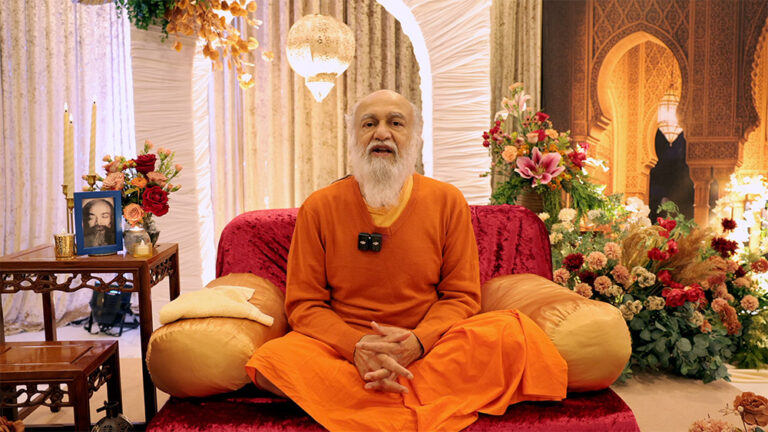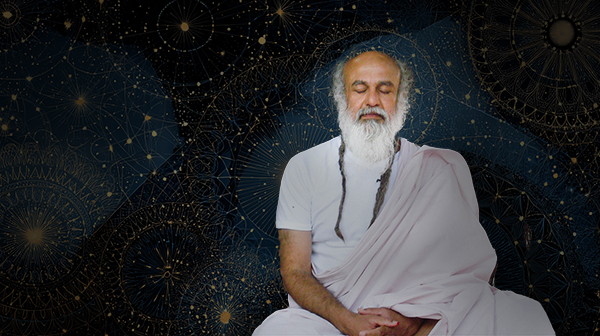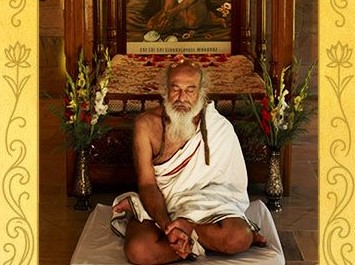Renunciation and meditation
Renunciation has to come from the mind, if you can let go of the ego and lose any expectations. When we do this – like service simply for the sake of service; you do service and do not expect anything – then there shall not be any desire. Your mind automatically becomes quiet when it doesn’t have any expectations. That is to be considered the highest renunciation, when you are ready to accept things as they come.
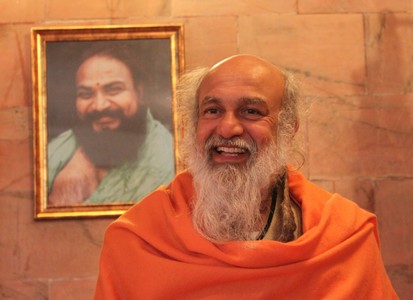
Shri Babaji arrived back at the Dehradun Ashram on 1st January 2010 offering all those present an opportunity to start the New Year in His presence. Bhajans were sung and everyone sat and enjoyed the bhandara prasad (mass feeding) that was offered.
On 6th January, the evening satsang at the Ashram welcomed guests Abbot Mark Serna from North America and Swami Atmananda from Ajatananda Ashram, Rishikesh. There were also devotees present from Austin, USA, England and from the local area. Before discussions began the Aarati took place. The atmosphere felt particularly Graced as Babaji’s assistants, devotees, monks, nuns and spiritual seekers from all parts of the globe listened intently as Babaji answered their questions through a seeming stream of wisdom based on the authority of His experience. Occasional electricity cuts gave rise to a somewhat mysterious atmosphere as the room was often plummeted into darkness, lighted only by a lamp which was brought out and placed in front of the altar. One couldn’t help but notice the brightness of Babaji’s eyes which were sparkling in the dimly lit room.
Babaji:
My Teacher, Shivabalayogi, performed a twelve year Tapas. To be precise, in His words, Tapas means when you are able to keep the mind totally into silence and focused onto one point at least for one hour, and you don’t allow the mind to waver into any imaginations. That He used to call as a meditation; then you can tell that you are meditating. Until then you try to meditate. So when a person is capable of keeping the mind silent for eight to ten hours in a stretch without any imagination and thought process coming, then a person can do Tapas.
Tapas means an individual imagined self is put into the fire of the Reality. That is how the Tapas word has been used. So He did it for twelve years, remaining in Samadhi for twenty hours a day. For two to three hours a day He used to come out just to have a bath and attend to His call of nature, take a little bit of food in a liquid form, most of the time He used to have milk — from 1949 to 1961. After that for thirty years He traveled around the country and abroad. He respected all religions and used to say that all religions are equal and honorable. In fact He spoke very fondly of Jesus Christ. In Indian culture a Yogi is also recognized like a Son of God.
Sometimes He didn’t like to be called a religious Teacher. Not that He didn’t like religion but He was often saddened by the misinterpretation and misuse by some quarters of humanity. So He always used to tell, “We are Yogi’s. We are for the entire humanity.” Like the blood is there in every human body, the mind also is there in every human mind and the mind has no religion, no such thing. It has to be controlled and made to go introvert towards the Divine.
He dropped His body attaining Maha Samadhi in 1994 and then in a vision He appeared to me. In fact He also had a very beautiful vision which transformed Him into such a Yogi. He was born to an ordinary weaver’s family, trying to overcome the poverty in His village in a small hamlet of coastal Andhra Pradesh. And at the age of fourteen when He was trying to squeeze out the juice from a fruit on 7th August in 1949, He saw that fruit taking the shape of a Shivalingham and from that a Jangama Sage with matted hair appeared and made Him to sit in the lotus posture, touched Him in-between eyebrows and patted Him, so He went into a deep meditation, Samadhi. Thus He left His home, He didn’t go back home, He continued and became a Yogi. He had overcome all desires and attained that Self Realization, total Peace. So that’s how a beautiful transformation happened. And in 1994 in November, He appeared to me in a vision and made me to sit for five years of Tapas.
He did recognize and taught us that apart from doing a meditation, as a human, we have triple responsibilities. We need to take care of our physical body’s health, and using this physical body we have to take care of the health of the mind. This means if the mind is purified and kept under control its thinking will be towards a larger cause always. That is the third one, upholding the moral responsibilities of consideration to each other, love and honor to each other. So that’s what He always advocated. For that purpose only He taught meditation.
He wanted us to do service also. For example for some time a couple of mentally-challenged boys were left here under my care to look after. Their parents were Swamiji’s devotees; the boys had become very violent, and were hard to manage. Then we taught them and I looked after them, tried to make them more independent. He used to tell me, “Instead of simply sympathizing you just have to try to help so that they can become independent, they can stand on their own feet.” That was one of the criteria for doing service to fellow beings of this world.
(Babaji becomes silent)
Babaji:
(to Abbot Mark Serna) If you like please tell us something about your life and mission…
Abbot Mark Serna:
Yes Babaji. Just very briefly again, we are very grateful for this opportunity to be here with You. The organization I belong to is of monks and nuns throughout the world, but my responsibility is in North America, to engage in inter-religious dialogue completely at the level of spiritual experience, not at the level of scholarship, but at the level of spiritual experience.
I have a question about spiritual experience if I may ask You Babaji? If all renunciation is for the sake of Divine Realization, then what is the highest renunciation to achieve the highest Realization?
Babaji:
The renunciation has to come from the mind, if you can let go of the ego and lose any expectations. When we do this – like service simply for the sake of service; you do service and do not expect anything – then there shall not be any desire. Your mind automatically becomes quiet when it doesn’t have any expectations. That is to be considered the highest renunciation, when you are ready to accept things as they come. If somebody might be praising, somebody might be criticizing, somebody might be helping, somebody might be creating an obstacle. So all these things we need to consider as the Divine’s Grace. Simply accept and keep going. This is the highest renunciation when we do not expect anything from this world but are ready to do all duties whenever, whatever. So gradually then the mind surrenders, going introvert we can achieve the highest spiritual truth of connecting to our Real Self and becoming aware of what we are.
This was one reason My Guru taught Me. Like years ago, He did not advocate any particular dress. Though He understood a dress would definitely have a code of conduct and its own greatness, He first wanted that as students we need to purify ourselves from inside, renounce from inside actually. For example in 1977 we had been to Rishikesh to have a bath in the Ganga and He saw a thread, that sacred thread on me that is normally a code of a particular community, the Brahmins who do the Gayatri japam in India. He didn’t like the idea. He was furious with me. He thought, “You will develop an ego of your own community. You should take this out; you should be universal to humanity.” And He made me take it off and we dropped in the Ganges and He sprinkled some water on my head and just patted: “From today onwards you are a monk. But do not ever claim that you are a monk. Try to live such a life so that people can call you a monk on their own.” That was the criteria He taught and gave of renunciation.
Question:
Babaji, it seems that in the different religious traditions, the monastic way of life has often been considered perhaps a more direct path or a path that offers a kind of simplicity or opportunity for renunciation and God Realization. As You were saying Babaji, the highest renunciation is to accept what comes into my life at this moment and not to fight it but to accept. That renunciation is open to everyone. So therefore my question is, is it valid or true to speak about one way of life being higher than another?
Babaji:
In my opinion, certainly not. When we try to consider one way of life as higher, then there is no renunciation. Like My Guru said, “If you are a monk you must know that you are there to serve the society. You should not think that you have grown two special horns on your head and there’s any special status for you. You shall remain as humble as possible.” And if you have become a monk, respect a householder equally. Just like, if one person has become a police officer, he cannot belittle an engineer, an engineer cannot belittle a doctor. So in the society all are equal, and if they are sincere, genuine and honest they will be able to contribute to the society’s growth and then we will be able to build a better world. So thus we should never consider one way of life as higher than the other. An unnecessary ego shall crop up and it will be an obstacle for our spiritual experiences and progress towards Realization.
In my opinion, a renunciation to adopt a particular way of life is there so that you are able to dedicate your attention towards a larger cause for the society. Suppose if you are a householder, your attention is likely to be preoccupied with your spouse and children. More than that you may not be able to think further of the society or the world’s cause and you may not be able to take out time to dedicate yourself. So when you adopt a way of life like a monk, a renounced person who would not have married, you can dedicate totally just for the welfare of the society, you shall not have any selfish interests or motivations. This is one criteria. Other than that we need to honor each other, whatever way of life we adopt.
Question:
Babaji, do You think it’s possible for a person in this body to in fact have Divine Union, Divine Realization and not know that truth?
Babaji:
Definitely, because it is impossible to know It. When you talk of the knowing, it would be through your mental consciousness only. But the ultimate truth of this mental consciousness is to be recognized as the Divine, that is All-Pervaded, which is the combination of Supreme Consciousness and Supreme Energy. That cannot be explained ever. You can simply become aware of it. It is something like, if you want to measure the space and know it, it is impossible — its length and breadth. It can never happen. The more you try to measure and claim that you have measured, you are simply going to limit that space. To know the space is to become aware of the space, which means you have to become the space itself. So that is how this mind, when it is thinking, is away from its original Supreme Consciousness, which is recognized as the Divine. So it becomes an individual consciousness with its own imagination. It creates an existence of its own with its own imagination which really does not exist. Just like the droplet of the ocean coming out of the ocean. The droplet has really no existence, it has to go back.
If a mind is less scattered it is better. Such a mind is to be considered as a non-violent mind which shall have a minimum of thinking that is needed to live in this world. Eventually it can go introverted. Through meditation the basic idea is to make this mind totally silent and focused. When such a thing happens automatically this mind, called consciousness, goes introverted and one day you achieve a total introverted standstillness of the mind, then you become aware of ‘That.’ But you don’t have to know that because there is no separation anymore. So that is the real love — when the separation is over, then there is contentment, no more desires. Until then there is always a desire of the ‘I’ and ‘I’ needing something. Even when we try to look for peace and happiness also, that need of desire is there. So thus it is definitely possible. There the total ego vanishes. Even the thought of ‘I’ also is to be considered as ego, spiritually, then that ‘I’ also dissolves; simply Existence is there.
That’s why God is God because He’s considered in total Maha Samadhi, meaning He has no desires, no such resolutions of any bias of good or bad, right or wrong. That’s why faith is taught in every religion. Faith means in a sense, like the sun has no biased resolutions such that, “Let my light go only to this person and not to this person.” Whichever object, whoever can go in front of the sun would receive that light. So whoever can connect themselves through the mind, when the prayer happens, it has to happen through the mind.
Whenever I get to address people in their places of worship I tell them, “When you come to the place of worship you must see that your mind is concentrated and applied there.” I remember, perhaps one of the sayings of Jesus: “When you are praying, if you have any enmity towards a neighbor, first forgive them so that your mind settles down there.” That is the basic idea in the prayer. So then the mind gets connected to the Divinity. Then such a prayer becomes more successful and you get connected to the Divine better. That’s why faith is taught. Whoever has the faith, they shall receive the Grace of the Divine. That’s precisely what I would think Jesus would have meant that, “If you knock, the door will be opened”.
Question:
So Babaji do You think that approaching our life of meditation and prayer with faith, would that be more important than the particular method we use in our meditation and prayer?
Babaji:
Yes. There can be several methods of prayer or meditation. The idea should be the mind’s focus; that should be there. That happens when you have total faith, and the total faith culminates in total surrender. When the mind is able to surrender giving up all its agitations and desires, then it becomes quiet and focused. That is the basic idea of trying to meditate. So any method can be used.
One of the methods we teach which came to us from our Guru, who obtained it by the Divine Consciousness appearing, is that you just have to focus your mind and sight in-between the eyebrows and just watch there. Like that you practice at least for one hour everyday and then slowly that mind comes back. And in this process, you are giving the mind itself a practice to become quiet and focused without any external anchor. Any other methods are always taught as a preliminary round of practice so that the mind becomes focused instead of running here and there, like sticking to one thought or one prayer, or repetition of any one name, these type of things that are taught. And some methods are taught so that you focus on the breath also. Eventually the mind has to give up that external anchor if it has to go introverted.
Question:
But the mind Babaji has to give up the particular method in order to go? So if for example, watching the breath as a preparation, then at a certain point even watching the breath is given up, is that what You’re saying?
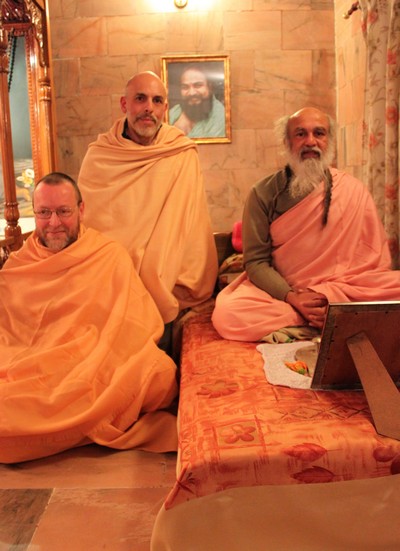
Babaji:
Yes, yes. Otherwise the mind is likely to get stuck to that breath. It won’t go introvert.
Question:
So You were describing the method taught here Babaji, is it with interior sight?
Babaji:
Yes, just focus your mind and sight by keeping the eyes closed, and just concentrate and focus your attention into the watching.
Question:
And at a certain point is even that given up then, that particular method?
Babaji:
Here in this method there is nothing to give up because the mind is not using any other anchor to give up at all. Here the mind itself is trying to become quiet on its own. That’s how we teach. Like you focus, and the second point we tell is, “There’s no need to repeat any name or any mantra, and do not imagine.” There is a third secret in meditation, because the mind has a tendency to make analyzations and judgments of the dualities of this world. Like the right and wrong, “Why is this happening? Why not something else? Why, this is good and this is bad?” After a stage it is taught that the Divine is All-Pervaded, Omnipresent, so you just try to stick to the ‘stop analyzing’ whether good comes or the bad comes. Because in this meditation this is a purifying process where all the imprints that are in the subconscious state are thrown out, like the garbage being thrown out. So when it’s going it gets evaporated, but because of the brain’s nature it de-codifies everything and a thought process and visual effect occurs. Watching that, the mind analyzes further.
The trick is that the mind imagines. When it imagines an image appears within the mind. Watching that image, the mind forgets that, “This image is there because of my imagination.” Instead of that, the mind gets involved with that image thinking it to be a fundamental truth. Then it analyzes that image further, “This is good or bad, this is mine or not, I want or I don’t want,” all these dualities. When it does this it makes a judgment also, then it absorbs an imprint. So that’s what happens, one thought goes away and we absorb another thought, getting involved into the whirlpool of, “Hen coming out of the egg, egg coming out of the hen.” It goes on. The secret is: “Do not analyze. Don’t imagine whatever comes. Just watch and observe.” Then that mind becomes quiet and withdrawn, then it enables itself to go introvert automatically.
Question:
So Babaji, it’s watching and observing what is arising without judgment or attachment…?
Babaji:
Yes, without judgment or thoughts.

